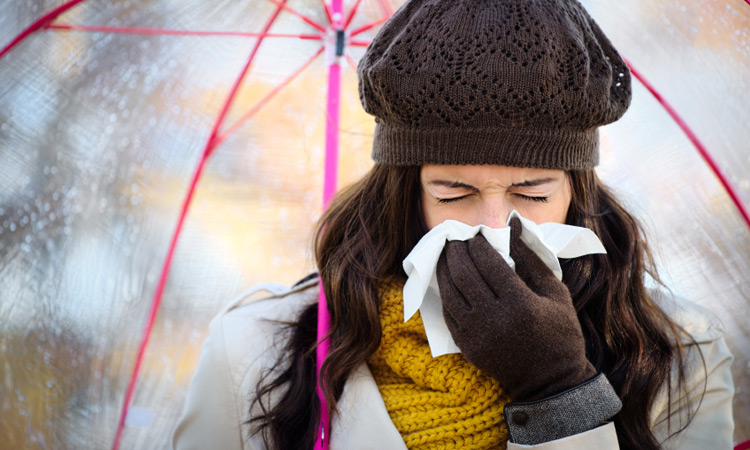
As fall moves toward winter, we also enter flu season. Huddling in close quarters to avoid the chill, we struggle to avoid a stranger’s cough or sneeze. Inevitably, many will succumb to the flu’s fever and chills, body aches, fatigue, lingering coughs, sharp throat pain, congestion, even vomiting or diarrhea. Some, particularly those at high risk, will suffer complications that require hospitalization and can even prove fatal. New research reveals fresh information about why winter is the time of year when influenza rears its ugly head. As a result, scientists may have uncovered a simple way to help combat this virus before it lands.
Why flu thrives in winter
A study at the University of Bristol examined the relationship between humidity levels and the transmission of influenza. While we normally associate cold air as feeling damp, there are, in fact, two different types of humidity: relative humidity (RH)—the type that causes rain—and absolute humidity (AH), which measures the air’s total water content.
Moisture in the air helps destroy the flu virus, but cold air cannot hold much water. Therefore, when AH drops in the cold of winter, less water in the air makes it easier for the virus to thrive and spread.
How to avoid the flu
The study also tested whether AH can be affected by placing humidifiers inside classrooms to destroy the flu virus. Researchers conclude, “There are data to suggest that outdoor AH levels affect humidity levels inside and that simple humidifiers may be adequate to raise AH to levels associated with a significant reduction in influenza virus survival.” By using a humidifier in moderation—to avoid the risk of mold—you may reduce your risk of contracting the flu.
According to the study, the flu abounds in winter not only because of lower AH, but because we spend more time inside, sharing germs in tight proximity. Therefore, staying away from crowds as much as possible and maintaining good levels of Vitamin D, using supplements to boost immunity, may also help protect you. Also, remember to wash your hands frequently with soap and water or, in the alternative, alcohol based cleaner.
Robin Ray Green—an acupuncturist and herbalist with a Master’s Degree in Chinese medicine—says the strength of your Chi, or life force, affects your susceptibility against the flu. “For example, on a plane, everyone is breathing the same air, but not everyone will get flu.”
She explains the distinction between Western medicine’s emphasis on minimizing germ exposure versus Chinese medicine’s concentration on keeping the Chi strong to create a better defense against germs.
During winter flu season, Chinese medicine advises getting more sleep as the dark hours increase and keeping the body warm—especially the neck—even if climate is temperate. Focus on staying hydrated, eating more seasonal golden and orange foods, and more cooked foods. A few preventative Chinese herbal remedies are also available.
Don’t worry about catching the flu. The increased stress will produce excess cortisol and weaken your immune system. Try meditation to reduce any excess strain on your immune system.
Best treatments and avoiding transmission
If you do contract the virus, basic treatment options can potentially shorten the length of the virus and alleviate symptoms.
At the first sign of the flu, Green prescribes a Chinese herb, gan mao ling, which can ward off the full blown virus. But if the virus progresses, she offers symptom specific herbal treatments.
Like Chinese medicine, homeopaths also offer herbal remedies at the onset of the flu virus and other treatments for specific symptoms.
The College of Family Physicians of Canada published an article discussing the treatment of influenza with a “Vitamin D hammer.” The author, Dr Schwalfenberg, explains, “This is a 1-time 50 000 IU dose of vitamin D3 or 10 000 IU 3 times daily for 2 to 3 days.” According to the report, patients indicate no symptoms after two-three days with no side effects. Dr Schwalfenberg is requesting a study to support his findings.
According to the Mayo Clinic, most bouts of the flu require only bed rest and plenty of fluids to prevent dehydration.
To prevent transmission, the Mayo Clinic advises you stay home until you’ve had no fever for 24 hours. Make sure you cover you mouth and nose when you cough and sneeze by using the crook of elbow or a tissue, which you immediately and safely discard. Then wash your hands thoroughly.
By practicing good health and hygiene, avoiding tight crowds when possible, adding supplements and a humidifier to your regimen, you’ll decrease your chances of contracting the flu this season. But you can’t spend winter in a cave or avoid your family and friends, so keep a positive attitude, and stay warm as you enjoy the season.
Click here to find out about Rose’s thoughts on wellbeing and health


